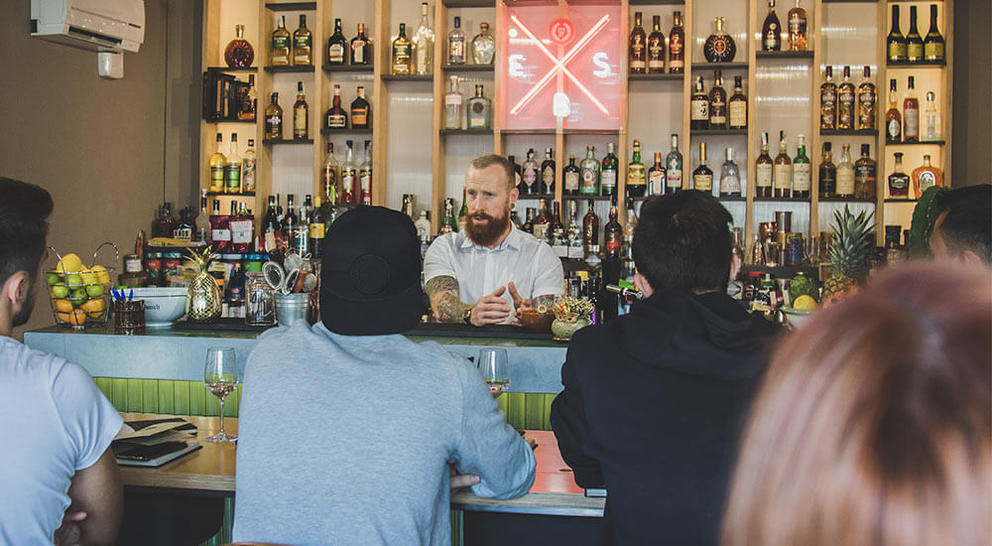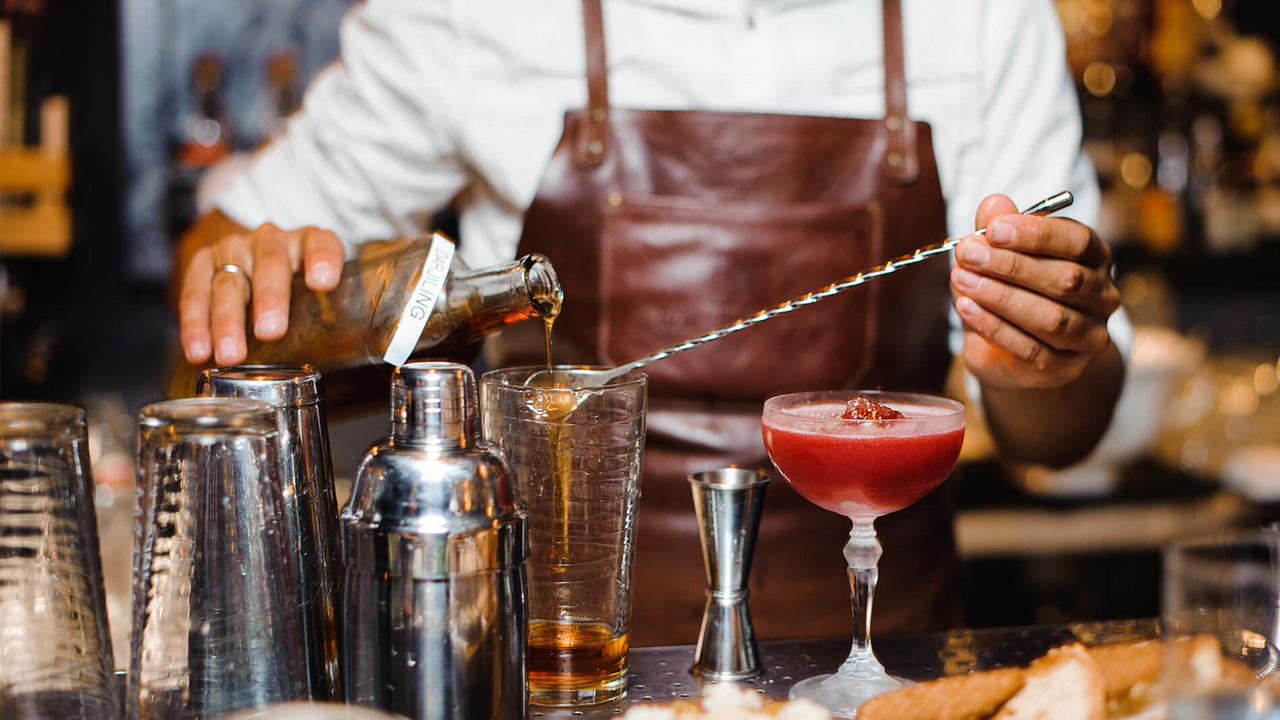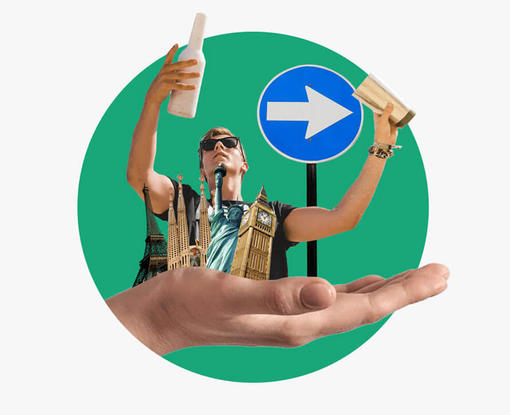Trying to make it as a bartender can be a long, hard journey. It can be even harder to find out exactly how to become a bartender in the first place. But don't worry, we've compiled a list of our top 6 tips!
If you're looking to get into bartending, let us guide you into getting your first bartending job...
1. Take a bartender course

Becoming a bartender is no walk in the park. It takes time to become fully proficient in the arts of bartending. Taking a bartending course can be a great way to get your bartender career up and running fast. By attending a bartending school, you'll be able to master the basics, as well as top tricks and tips from expert bartenders. Attaining bartender certification can really help a job application, so it's worth considering at least.
Here at European Bartender School, we offer a four-week bartending course for aspiring bartenders! Work and develop your bartending skills from our fully trained professionals in schools all over the world. You'll put your bartending knowledge to the test with daily challenges, all to prepare you for the bar. Don't underestimate how much bartending courses can help you on your journey (especially at the world's largest bartending school)!
2. Learn from the best

Another great tip to becoming a bartender is to learn from those around you. By this, we mean getting a bartending mentor. If you're already working behind or in a bar, see if some of your more experienced colleagues can teach you the ropes. Think of it like attending a mini bartending school.
By finding yourself a mentor, you'll be able to learn from their experience and knowledge. This could be bartender lingo, cocktail recipes, bar skills or even how to use the bartending tools, it all helps. As well as the hard, practical skills, you'll also learn soft skills. Learning from a successful bartender requires you to be sociable, humble and to multitask, which will put you in good stead for the future.
Whether you want to become a Jedi or bartender, finding a mentor is an invaluable experience and one that can truly answer 'how to become a bartender'.
3. Make your CV stand out

Applying for any position can be a daunting experience but a job behind the bar can be a whole new level of difficult. Writing 'I mix drinks quickly' isn't enough to get you any bar position, in reality. You'll need to really go into what makes you stand out. Moreover, every establishment has significant differences and desires about why a specific applicant will best suit them over the others. For example, applying for a high-end cocktail bar is a lot different to a nightclub bar. So, it's worth considering these sorts of things in mind when applying!
Essentially, the bar manager wants to see what you're all about. This means a whole range of aspects, from cocktail knowledge to personality. Here at EBS, our bartending graduates have access to EBS MatchStaff, an exclusive job finding platform for bartenders. We asked them what they thought the top considerations should be...
Their top tips for writing an excellent bartender CV include: listing hard and soft skills, adding a personal touch to the CV, listing previous but relevant experience and keeping it succinct. Follow these rules and that bar manager will be sure to call you!
4. Practice your skills and knowledge

It may sound cliché and boring but becoming a bartender happens through good practice. Knowing your stuff is a basic requirement for any job as a bartender. This doesn't mean knowing a few drinks, it means knowing 70+ cocktails in and out. Whilst the popular drinks are nice, not everyone is ordering them, so you'll need to know what a Boulevardier is, as well as a Negroni and an Americano.
Also, practice your skills. Mixing drinks is basic stuff that every bar will already expect you to know. Successful bartenders know all the tiny differences. Not every cocktail needs to be shaken, garnished with a lemon wheel and served with some ice cubes. Know the differences and learn the methods thoroughly. That's how you differentiate yourself from the rest.
When you're serving customers during a busy service, having this information engrained into your knowledge pays off. Eventually, this will all be second nature and your bartending career will have lift off!
5. Work your way up

Everyone has to start somewhere, even the best of the best bartenders started at the bottom. Learning how to become a bartender is a slow process, so working your way up is a good route. By becoming a junior bartender you will learn so much knowledge about bar best practices, like mixing drinks and serving alcohol. Starting at the bottom means you'll have room to make mistakes and grow from them, making you even better.
Developing your customer interaction skills, learning how to prepare drinks well and keeping the bar stocked are just some of the key skills you'll learn along the way. Some of the best skills can only be learned with time.
Read on to discover a slightly different route into bartending by becoming a bartender's barback...
6. Develop your people skills

Being a bartender isn't sitting behind a computer in an office all day. You need to interact with customers every single service. Bartenders without good customer service skills are unlikely to be employed. The customer's experience isn't just the cocktail, it's about the whole vibe of the bar and yourself. Bartenders contribute hugely to this vibe, whether that be good or bad.
Be polite and humour your guests. Be interested in them and if they ask for a recommendation and fulfill that request to the best of your abilities.
One last thing to note, creepy bartenders don't go down well with customers (just like most people). Respect the customers and yourself.
7. Become a barback

This one is more so for our American friends out there reading this. So, what is a barback? Barbacks are the people behind the bar helping out the bartenders. Essentially, they are a bartender's assistant. They may be responsible for organisation and cleaning, for example. The relationship between a barback and a bartender is normally very close. This is great if you want to become a bartender. Even better if you want to become a bartender with no experience in bartending!
By becoming a barback, you'll have first hand experience of what it takes to mix classic cocktails and organise drink orders. You'll pick up valuable tips about good bartender etiquette, all without attending a bartending school. This tip may take you on a longer route than the others, but it's still worth a consideration.
8. Get your bartender license

Once again, this one only really applies to those in North America. But make sure you check out the legal requirements of bartending, wherever you are based.
If you wish to get that dream bartender job, you may need to understand the law first and become qualified in it. We don't mean studying a whole law degree, but rather understanding laws around serving alcoholic beverages. Knowing the legal drinking age of your bar guests, when to serve alcohol and being legally allowed to serve alcohol, are just some of the aspects you'll become covered by with a bartender license.
Getting the license alone will not guarantee you a job in bartending. However, it will mean you can pursue your dream, without legal ramifications.
Final thoughts...
By following these 8 top pieces of advice, means you'll be a bartender in no time. It's all about finding that balance between experience, hard skills, soft skills and knowledge. Not every person reaches somewhere the same way. Find a good place to start and keep at it. The best bartenders are able to adapt easily, even when it gets tough!
Good luck!

